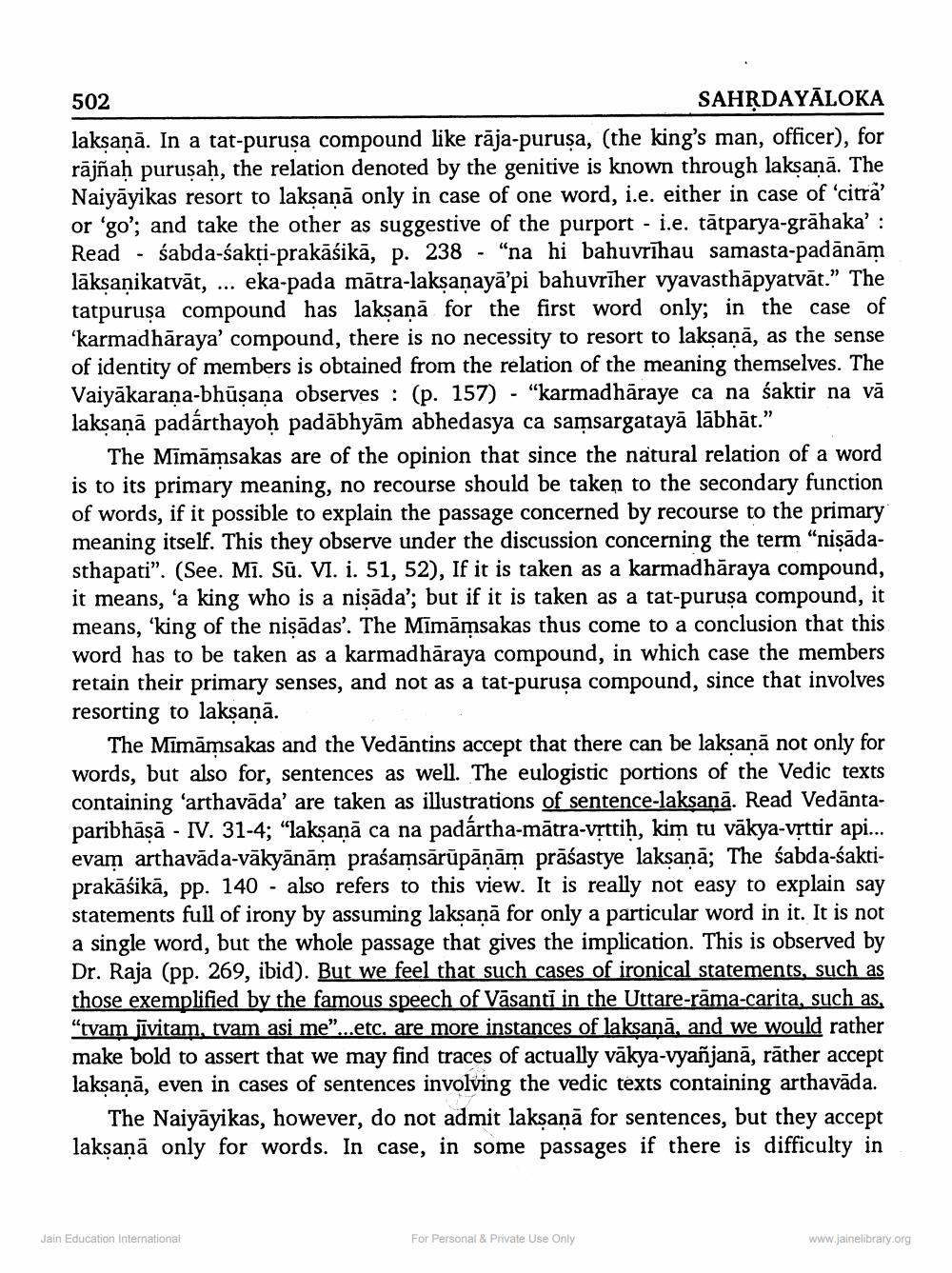________________
502
SAHĶDAYĀLOKA laksanā. In a tat-purusa compound like rāja-purusa, (the king's man, officer), for rājñaḥ puruṣaḥ, the relation denoted by the genitive is known through laksanā. The Naiyāyikas resort to laksaņā only in case of one word, i.e. either in case of 'citra or 'go'; and take the other as suggestive of the purport - i.e. tātparya-grāhaka': Read - śabda-śakti-prakāśikā, p. 238 - "na hi bahuvrīhau samasta-padānām lāksanikatvāt, ... eka-pada mātra-laksanayā'pi bahuvrīher vyavasthāpyarvāt.” The tatpuruşa compound has laksaņā for the first word only; in the case of ‘karmadhāraya' compound, there is no necessity to resort to laksaņā, as the sense of identity of members is obtained from the relation of the meaning themselves. The Vaiyakarana-bhūsana observes : (p. 157) - "karmadhāraye ca na śaktir na vā laksaņā padárthayoh padābhyām abhedasya ca samsargatayā lābhāt.”
The Mimāmsakas are of the opinion that since the natural relation of a word is to its primary meaning, no recourse should be taken to the secondary function of words, if it possible to explain the passage concerned by recourse to the primary meaning itself. This they observe under the discussion concerning the te sthapati”. (See. Mi. Sū. VI. i. 51, 52), If it is taken as a karmadhāraya compound, it means, 'a king who is a nisāda'; but if it is taken as a tat-puruşa compound, it means, 'king of the nişādas'. The Mīmāmsakas thus come to a conclusion that this word has to be taken as a karmadhāraya compound, in which case the members retain their primary senses, and not as a tat-puruşa compound, since that involves resorting to lakṣaṇā.
The Mimāmsakas and the Vedāntins accept that there can be laksanā not only for words, but also for, sentences as well. The eulogistic portions of the Vedic texts containing ‘arthavāda' are taken as illustrations of sentence-laksanā. Read Vedāntaparibhāṣā - IV. 31-4; “laksaņā ca na padártha-mātra-vrttiḥ, kim tu vākya-vrttir api... evam arthavāda-vākyānām praśamsārūpānām prāśastye laksanā; The śabda-śaktiprakāśikā, pp. 140 - also refers to this view. It is really not easy to explain say statements full of irony by assuming laksanā for only a particular word in it. It is not a single word, but the whole passage that gives the implication. This is observed by Dr. Raja (pp. 269, ibid). But we feel that such cases of ironical statements, such as those exemplified by the famous speech of Vasanti in the Uttare-rāma-carita, such as, "tyam jīvitam, tvam asi me"...etc. are more instances of laksanā, and we would rather make bold to assert that we may find traces of actually vākya-vyañjanā, rāther accept laksanā, even in cases of sentences involving the vedic texts containing arthavāda.
The Naiyāyikas, however, do not admit lakṣaṇā for sentences, but they accept lakṣaṇā only for words. In case, in some passages if there is difficulty in
Jain Education International
For Personal & Private Use Only
www.jainelibrary.org




